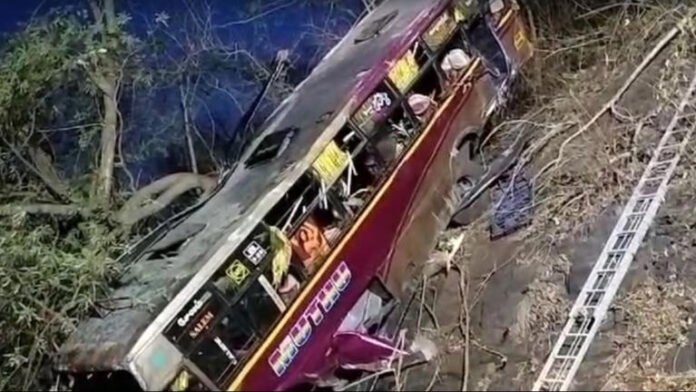At least four individuals have lost their lives, and 45 others have been injured after a bus plunged into a deep gorge in Tamil Nadu. The incident, which occurred in the hilly terrain of the southern state, has sent shockwaves through the community, highlighting the urgent need for improved road safety measures and emergency response protocols.
The bus, reportedly carrying passengers on a journey through the picturesque landscapes of Tamil Nadu, met with tragedy when it veered off the road and tumbled down a steep gorge. Eyewitnesses described a scene of chaos and horror as the bus plummeted into the abyss, leaving bystanders stunned and scrambling to assist those in need.
The aftermath of the accident was marked by scenes of rescue and recovery efforts, as emergency services rushed to the site to provide assistance to the injured and retrieve the bodies of those who perished in the crash. The rugged terrain presented challenges for rescue teams, who worked tirelessly to navigate the treacherous conditions and reach those stranded in the gorge.
As the extent of the tragedy became apparent, authorities mobilized resources to coordinate medical treatment for the injured and support for the families of the victims. Hospitals in the region were inundated with casualties, as medical personnel worked around the clock to provide critical care to those affected by the accident.
The loss of life and the scale of injuries sustained in the bus accident have prompted soul-searching and calls for action to prevent similar incidents from occurring in the future. Road safety advocates have emphasized the need for enhanced infrastructure, including improved signage, guardrails, and road maintenance, to mitigate the risks posed by hazardous terrain and challenging driving conditions.
Furthermore, there have been renewed calls for stricter enforcement of traffic regulations and enhanced training for drivers operating in hilly and mountainous regions. The need for regular vehicle inspections and maintenance checks to ensure roadworthiness has also been underscored as a crucial aspect of preventing accidents and preserving passenger safety.
In addition to addressing immediate safety concerns, the tragic bus accident in Tamil Nadu has drawn attention to the importance of emergency preparedness and response mechanisms. Timely and coordinated efforts by emergency services played a crucial role in minimizing further loss of life and providing assistance to those in need.
However, the incident has also shed light on areas where improvements can be made, including the need for better communication networks and faster response times in remote and inaccessible areas. Strengthening the capacity of local authorities and emergency responders to handle large-scale emergencies effectively is essential for saving lives and mitigating the impact of disasters.
As the community grapples with the aftermath of the bus accident, there is a collective sense of mourning and solidarity as people come together to support one another in this time of tragedy. Vigils have been held to honor the memory of those who lost their lives, while efforts are underway to provide assistance and relief to the families affected by the accident.
In the face of such a profound loss, there is a renewed commitment to prioritizing safety and taking proactive measures to prevent future accidents on the region’s roads. By learning from this tragedy and implementing measures to enhance road infrastructure, strengthen enforcement mechanisms, and improve emergency response capabilities, we can honor the lives lost in this tragic accident and work towards building safer communities for all.
Furthermore, the bus accident serves as a stark reminder of the importance of public awareness and education campaigns aimed at promoting responsible driving practices and passenger safety. Educating both drivers and passengers about the risks associated with traveling on mountainous roads and the precautions that can be taken to minimize those risks is essential for fostering a culture of road safety. By empowering individuals with knowledge and awareness, we can empower them to make informed decisions and take proactive steps to protect themselves and others while on the road.

